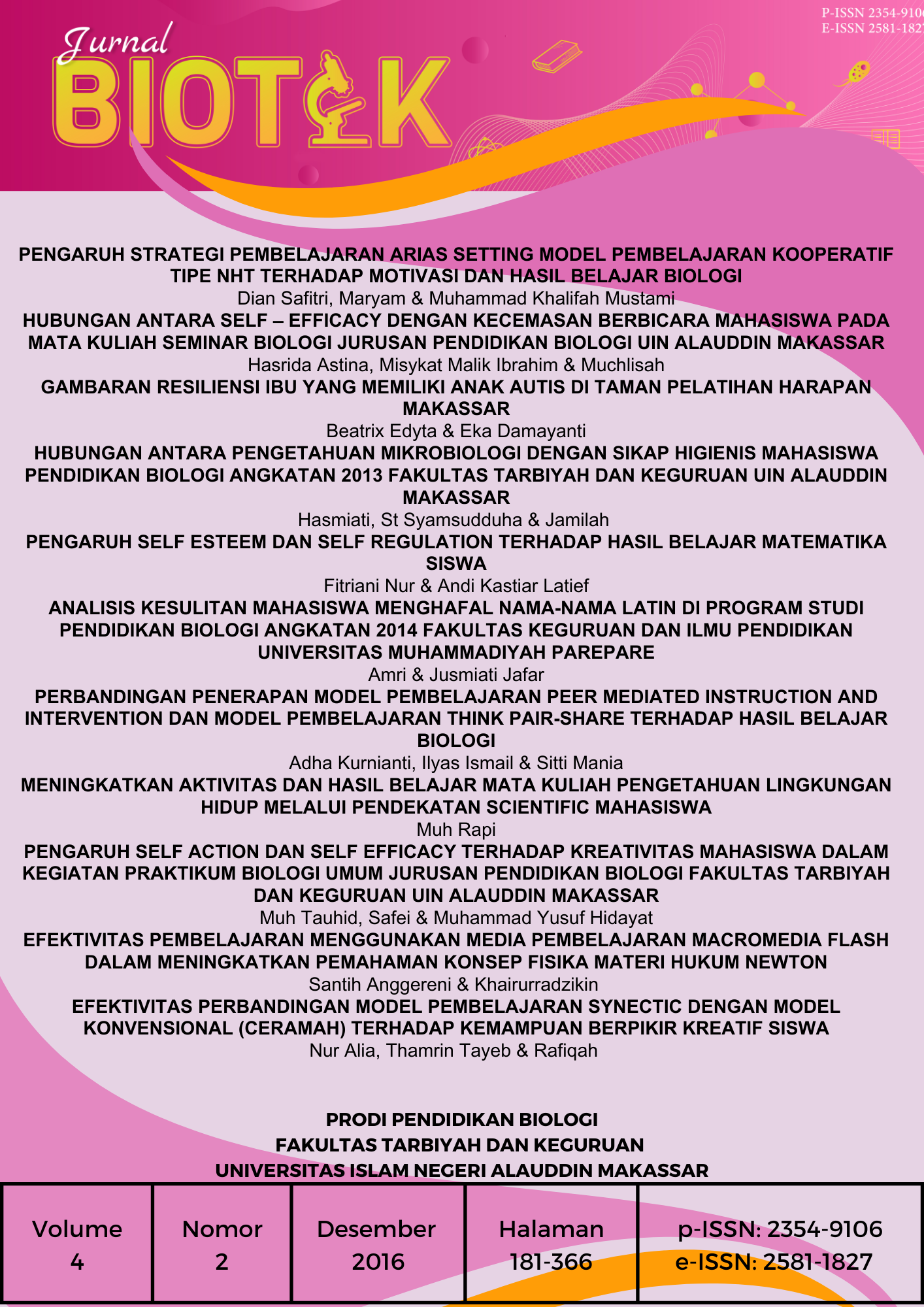PENGARUH SELF ESTEEM DAN SELF REGULATION TERHADAP HASIL BELAJAR MATEMATIKA SISWA
Abstract
The research aims to: 1) describe the Self Esteem of the eleventh grade students of Senior Islamic High School Guppi of Samata, Gowa regency; 2) describe the Self Regulation of the eleventh grade students of Senior Islamic High School Guppi of Samata, Gowa regency,3) find out the students’ Mathematic learning outcome of the eleventh grade students of Senior Islamic High School Guppi of Samata, Gowa regency, 4) find out the effect of Self Esteem on the students’ Mathematic learning outcome of the eleventh grade students of Senior Islamic High School Guppi of Samata, Gowa regency, 5) to find out the effect of Self regulation on the students’ Mathematic learning outcome of the eleventh grade students of Senior Islamic High School Guppi of Samata, Gowa regency, and 6) find out the effect of Self Esteem and Self Regulation on the students’ Mathematic learning outcome of the eleventh grade students of Senior Islamic High School Guppi of Samata, Gowa regency. The research used Ex-postfacto method with double paradigm research design. The population of this research was all the students of the eleventh grade of Senior Islamic High School Guppi of Samata, Gowa regency which consisted of 55 students while the sample was 48 students by using random sampling technique. The Data were analyzed by using descriptive and inferential statistics by using simple regression analysis and double regression analysis. The research findings showed that there was the effect of Self Esteem and Self Regulation on the students’ Mathematic learning outcome of the eleventh grade students of Senior Islamic High School Guppi of Samata, Gowa regency.
Downloads
References
Agustiya, Rozana Ika. (2008). ”Hubungan Regulasi Diri dengan Prestasi Belajar pada Siswa SMA 29 Jakarta”. Skripsi. Jakarta: Fakultas Psikologi UIN Syarif Hidayatullah.
Apsari, Bekti Susilo, dkk. (2014). “Pengaruh Efikasi Diri, Pemanfaatan Gaya Belajar Dan Lingkungan Teman Sebaya Terhadap Prestasi Belajar Akuntansi”. Jurnal Pendidikan UNS 3, no.1.
Azwar, Saifuddin. (2010). Pengantar Psikologi Intelegensi. Yogyakarta: Pustaka Pelajar Offset.
Daryanto. (2014). Evaluasi Pendidikan. Jakarta: RinekaCipta.
Departemen Agama RI, (2006). Qur’an Tajwid dan Terjemahan. Jakarta: Magfirah Pustaka.
Indrawan, Rully dan Yaniawati, Poppy. (2014). Metodologi Penelitian. Bandung: Refika Aditama.
Irawati, Neny dan Hajat, Nurahma. (2012). “Hubungan Antara Harga diri (Self Esteem) dengan Prestasi Belajar pada Siswa SMKN 48 di Jakarta Timur”. Jurnal EconoSains 10, no.2.
Kennedy, Declan, dkk. (2012). “Writing and Using Learning Outcomes: a Practical Guide”. Jurnal University College CorkIrlandia, no. 1.
Lubis, dan Handayani, Susi. (2011). ”Hubungan Self-esteem dengan Subjective Well-Being Karyawan UIN Syarif Hidayatullah Jakarta”. Skripsi. Jakarta: UIN Syarif Hidayatullah.
Muti’ah, Nur. ”Peran Belajar Berdasar Regulasi Diri, Dukungan Sosial Keluarga dan Efikasi Diri Terhadap Prokrastinasi Akademik”. Skripsi. Yogyakarta: Universitas Ahmad Dahlan Yogyakarta.
Pullmann, Helle dan Allik, Jüri. (2008). “Relations of academic and general self-esteem to school achievement”, Personality and Individual Differences 45.
Purwanto. (2014). Evaluasi Hasil Belajar. Cet.VI; Surakarta: Pustaka Pelajar.
Republik Indonesia. “Undang-Undang RI Nomor 20 tahun 2003 tentang Sistem Pendidikan Nasional”.
Yasdiananda, Eric W. “Hubungan Antara Self Esteem dengan Asertivitas pada siswa kelas X SMAN 5 Merangin”. Skripsi. Jambi.
Authors who publish with Jurnal Biotek agree to the following terms: Authors retain the copyright and grant Universitas Islam Negeri Alauddin Makassar right of first publication with the work simultaneously licensed under a Creative Commons Attribution License (CC BY-SA 4.0) that allows others to share (copy and redistribute the material in any medium or format) and adapt (remix, transform, and build upon the material) the work for any purpose, even commercially with an acknowledgement of the work's authorship and initial publication in Universitas Islam Negeri Alauddin Makassar. Authors are able to enter into separate, additional contractual arrangements for the non-exclusive distribution of the journal's published version of the work (e.g., post it to an institutional repository or publish it in a book), with an acknowledgement of its initial publication in Universitas Islam Negeri Alauddin Makassar. Authors are permitted and encouraged to post their work online (e.g., in institutional repositories or on their website) prior to and during the submission process, as it can lead to productive exchanges, as well as earlier and greater citation of published work (See The Effect of Open Access).

This work is licensed under a Creative Commons Attribution-ShareAlike 4.0 International License.



